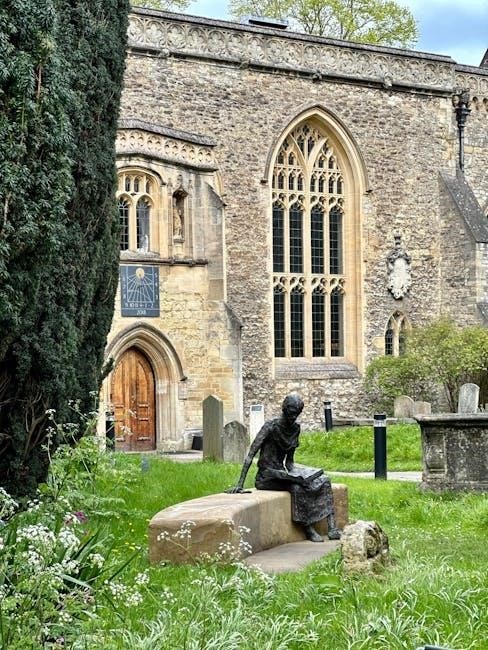Guide Me, O Thou Great Jehovah is a beloved Baptist hymn, inspired by Scripture, emphasizing faith, guidance, and pilgrimage․ Its rich history and theological depth resonate deeply, connecting congregations through powerful lyrics and enduring legacy․
Overview of the Hymn
Guide Me, O Thou Great Jehovah is a powerful hymn that reflects the Christian journey, emphasizing trust in God’s guidance and provision․ Written by William Williams in 1745, it captures the essence of pilgrimage and reliance on divine strength․ The lyrics vividly depict a believer’s walk through life’s challenges, seeking refuge in Jehovah’s might․ The hymn’s imagery, such as the “barren land” and “crystal fountain,” symbolizes spiritual longing and renewal․ Often paired with the iconic melody “Cwm Rhondda,” it has become a cornerstone of Baptist worship, resonating with congregations for centuries․ Its enduring appeal lies in its timeless themes of faith, hope, and surrender to God’s will․
Significance in Baptist Worship
Guide Me, O Thou Great Jehovah holds profound significance in Baptist worship, embodying core Baptist values such as trust in divine guidance and communal praise․ Its themes of pilgrimage and reliance on God resonate deeply with Baptist congregations, who emphasize personal faith and collective spiritual journeys․ The hymn’s powerful imagery and enduring melody foster a sense of unity and comfort, making it a cornerstone in Baptist services․ Often sung during moments of reflection or missions emphasis, it serves as a unifying hymn, bridging generations and reinforcing the Baptist identity․ Its presence in the hymnal underscores its role in shaping and enriching Baptist worship experiences, providing solace and inspiration to believers seeking divine direction and strength․
Purpose of the Article
This article delves into the rich history, theological depth, and cultural impact of the hymn Guide Me, O Thou Great Jehovah, exploring its significance within the Baptist tradition․ By examining its origins, lyrical themes, and musical composition, the article aims to illuminate the hymn’s enduring relevance in Baptist worship․ It also seeks to analyze its role in shaping spiritual practices and its adaptation across generations․ The purpose is to provide a comprehensive understanding of the hymn’s influence on Baptist identity and its continued use in contemporary worship settings․ Through this exploration, readers will gain insight into the hymn’s lasting legacy and its importance in the Baptist hymnal․

Historical Background
Guide Me, O Thou Great Jehovah, written by William Williams in 1745, is a cherished hymn in Welsh Baptist tradition, reflecting a deep spiritual journey and enduring faith․
The Author: William Williams
William Williams, a Welsh poet and minister, authored Guide Me, O Thou Great Jehovah in 1745․ A prominent figure in Welsh Baptist circles, his hymns reflected deep spirituality and a pilgrim’s journey․ As a traveling preacher, Williams’ work resonated with believers, blending theological depth with heartfelt emotion․ His compositions, including this enduring hymn, remain cherished in Baptist worship, showcasing his lasting impact on Christian song․
Composition Date and Context
Guide Me, O Thou Great Jehovah was composed by William Williams in 1745, during a period of spiritual awakening in Wales․ Originally written in Welsh as part of Williams’ collection Hallelujah: neu, Casgliad o Hymnau, the hymn captures the essence of a Christian’s pilgrimage and trust in divine guidance․ Reflecting the evangelical fervor of the time, it resonated deeply with Baptists, who embraced its themes of reliance on God’s power and the journey of faith․ The hymn’s creation within this context underscores its relevance as a heartfelt prayer for strength and direction, making it a timeless piece in Baptist worship traditions․
Evolution of the Hymn
Guide Me, O Thou Great Jehovah has undergone a remarkable evolution since its composition in 1745․ Originally written in Welsh by William Williams, the hymn gained widespread popularity when paired with the iconic melody “Cwm Rhondda” in 1907․ This union transformed it into a powerful and singable anthem, embraced by Baptists and other denominations worldwide․ Over time, the hymn has been translated into multiple languages and included in numerous hymnals, such as The Baptist Church Hymnal and Hymns Ancient and Modern․ Its enduring appeal lies in its timeless themes of trust in God’s guidance and the Christian pilgrimage, ensuring its continued relevance in modern worship․

Lyrical Analysis
Guide Me, O Thou Great Jehovah features vivid imagery of pilgrimage, emphasizing trust in divine guidance․ Its lyrics symbolize a journey through life’s challenges, seeking strength and eternal rest․
Structure and Verse Breakdown
The hymn Guide Me, O Thou Great Jehovah is structured with multiple verses, each emphasizing themes of pilgrimage and divine guidance․ Typically, it consists of four verses, each with a consistent rhyme scheme and poetic meter, creating a harmonious flow․ The first verse introduces the journey through a barren land, seeking strength from Jehovah․ Subsequent verses expand on this theme, incorporating imagery of a crystal fountain and a heavenly feast․ Each verse builds on the idea of trust in God’s providence, culminating in a powerful expression of reliance on divine leadership․ The structure enhances the hymn’s emotional and theological depth, making it a resonant prayer for believers․
Imagery and Symbolism

The hymn Guide Me, O Thou Great Jehovah is rich in vivid imagery and symbolism, reinforcing its theological themes․ The “barren land” symbolizes life’s challenges and humanity’s spiritual dryness, while the “crystal fountain” represents divine cleansing and eternal life․ The “bread of heaven” signifies spiritual nourishment and Christ’s sustaining presence․ The image of being held by God’s “powerful hand” embodies divine protection and strength․ The hymn also evokes the journey of faith, with the “Promised Land” symbolizing salvation and eternal rest․ These symbols create a profound narrative of trust, guidance, and ultimate redemption, resonating deeply with Baptist worshippers and enriching their devotional experience․
Theological Themes
The hymn Guide Me, O Thou Great Jehovah explores profound theological themes, including divine guidance, trust in God’s sovereignty, and the believer’s reliance on His strength․ It emphasizes the Christian pilgrimage, portraying life as a journey through a barren land, where believers depend on God’s mighty hand for sustenance and protection․ The hymn also highlights the redemptive work of Christ, symbolized as the “bread of heaven,” and the ultimate hope of eternal rest in the Promised Land․ These themes reflect Baptist theology’s focus on personal faith, divine providence, and the assurance of salvation, resonating deeply with worshippers seeking spiritual comfort and assurance in their walk with God․

Musical Composition
The hymn is set to the melody “Cwm Rhondda”, a Welsh tune composed by John Hughes for a Baptist singing festival in Wales, matching its powerful lyrics․
Melody: “Cwm Rhondda”
The melody “Cwm Rhondda” was composed by John Hughes in 1907 for a Baptist singing festival in Wales․ Its rousing, march-like quality perfectly complements the hymn’s powerful lyrics, creating a sense of strength and pilgrimage․ The melody’s robust and uplifting nature has made it a timeless pairing for “Guide Me, O Thou Great Jehovah”, enhancing its emotional and spiritual impact․ Sung in congregations worldwide, the tune has become synonymous with the hymn, evoking a sense of trust and reliance on God․ Its enduring popularity underscores its ability to resonate with worshippers, making it a cornerstone of Baptist musical tradition․
Musical Style and Influence
The musical style of “Guide Me, O Thou Great Jehovah” is characterized by its robust and uplifting melody, which complements the hymn’s themes of trust and pilgrimage․ The tune “Cwm Rhondda”, composed by John Hughes in 1907, features a rousing, march-like quality that has made it a favorite in Baptist worship․ Its powerful rhythm and harmonies evoke a sense of collective strength and unity, resonating deeply with congregations․ The hymn’s musical influence extends beyond Baptist traditions, shaping the style of other worship songs and inspiring modern arrangements․ Its enduring legacy lies in its ability to connect worshippers emotionally and spiritually, making it a cornerstone of Christian music heritage․

Baptist Hymnal Inclusion
Guide Me, O Thou Great Jehovah has been a cornerstone in Baptist hymnals since its composition in 1745․ Featured in The Baptist Church Hymnal and Hymns Ancient and Modern Revised, it remains a beloved choice for worship, reflecting its enduring theological and emotional resonance within the Baptist tradition․
History of Inclusion
Guide Me, O Thou Great Jehovah first appeared in Baptist hymnals in the mid-18th century, following its composition in 1745 by William Williams․ The hymn gained popularity and was included in The Baptist Church Hymnal by 1933 and later in Hymns Ancient and Modern Revised in 1950․ Its powerful lyrics and theological depth made it a staple in Baptist worship, ensuring its presence in successive editions․ Over the years, its inclusion has remained consistent, reflecting its enduring appeal and spiritual significance within the Baptist tradition․ The hymn’s timeless message of divine guidance continues to resonate with congregations, solidifying its place in Baptist hymnals for generations․
Position in the Hymnal
Guide Me, O Thou Great Jehovah is prominently featured in Baptist hymnals, often categorized under themes of pilgrimage, divine guidance, and trust in God․ In Hymns Ancient and Modern Revised (1950), it is listed as Hymn 488, while in The Baptist Church Hymnal (1933), it appears in similar sections dedicated to spiritual journeys․ The hymn’s placement reflects its theological emphasis on reliance on God’s sovereignty, making it a natural fit for sections focused on devotion and trust․ Its inclusion in these prominent positions underscores its enduring relevance and resonance within Baptist worship traditions, ensuring its accessibility for congregational singing and personal reflection․
Popularity Among Baptists
Guide Me, O Thou Great Jehovah holds a revered place in Baptist worship, cherished for its powerful lyrics and enduring message․ Its inclusion in numerous Baptist hymnals, such as Hymns Ancient and Modern Revised (1950) and The Baptist Church Hymnal (1933), reflects its widespread acceptance․ The hymn is frequently sung during special occasions, including communion services and missions-themed gatherings, resonating deeply with congregations․ Its themes of divine guidance and trust in God’s providence align closely with Baptist theology, making it a beloved choice for both corporate and personal worship․ The hymn’s timeless appeal lies in its ability to inspire faith and comfort, ensuring its continued popularity across generations of Baptists․

Worship Usage
Common Occasions for Use
Guide Me, O Thou Great Jehovah is often sung during baptism services, communion, and missions-themed gatherings, resonating with themes of spiritual pilgrimage and divine guidance․
Guide Me, O Thou Great Jehovah is frequently sung during baptism services, communion, and missions-focused gatherings․ Its themes of divine guidance and pilgrimage make it ideal for these sacred moments․ The hymn is also a popular choice for Easter celebrations, emphasizing resurrection and spiritual renewal․ Additionally, it is often performed during congregational worship services, particularly at the beginning or closing, to inspire faith and unity․ Its powerful lyrics resonate deeply, making it a staple in Baptist worship, especially during times of reflection, dedication, and rejoicing․
Role in Baptist Services
Guide Me, O Thou Great Jehovah plays a significant role in Baptist services as a unifying hymn that strengthens congregational faith․ Its powerful lyrics often accompany moments of spiritual reflection, prayer, and invocation, inviting worshippers to seek divine guidance․ The hymn is commonly sung during invitational segments, encouraging believers to deepen their commitment to Christ․ Its themes of pilgrimage and reliance on God resonate deeply, making it a staple in Baptist worship․ It is also frequently used during missionary services, emphasizing trust in God’s leadership․ The hymn’s robust melody and profound theology ensure its enduring role in inspiring and uniting Baptist congregations worldwide․
Congregational Engagement
Guide Me, O Thou Great Jehovah fosters profound congregational engagement through its resonant lyrics and stirring melody․ The hymn’s themes of pilgrimage and divine guidance encourage collective worship, uniting believers in shared faith․ Its imagery of spiritual journey evokes personal reflection and communal prayer․ The powerful chorus, with its plea for strength, is often sung with fervor, creating a sense of unity among worshippers․ The hymn’s accessibility and memorable verses make it easy for congregations to participate, fostering a sense of togetherness․ Its emotional resonance and theological depth ensure active engagement, making it a cherished part of Baptist worship experiences for generations․

Cultural Impact
Guide Me, O Thou Great Jehovah has left an indelible mark on Christian culture, transcending denominational boundaries․ Its timeless appeal has inspired translations and adaptations, making it a cherished hymn globally․
Regional Variations
The hymn Guide Me, O Thou Great Jehovah has deep roots in Welsh culture, originally written in Welsh as Arglwydd, Arwain Fi by William Williams in 1745․ Its powerful melody, Cwm Rhondda, composed by John Hughes in 1907, reflects the rich musical heritage of Wales․ In Baptist communities across the UK and USA, the hymn gained popularity for its resonant theology and stirring tune․ Regional adaptations often emphasize congregational participation, with robust harmonies in Welsh chapels and a cappella traditions in Appalachian Baptist churches․ Its universal themes of pilgrimage and divine guidance have allowed it to transcend cultural boundaries, making it a beloved hymn worldwide․
Influence on Other Hymns
Guide Me, O Thou Great Jehovah has profoundly influenced the development of Christian hymnody, particularly within Baptist traditions․ Its powerful imagery and theological themes inspired later hymn writers to craft songs that emphasize divine guidance and pilgrimage․ The hymn’s structure and use of metaphor have served as a model for composers seeking to blend deep spirituality with accessible lyrics․ Additionally, its melody, Cwm Rhondda, has been adapted for other hymns, showcasing its enduring musical appeal․ This hymn’s legacy is evident in its role as a cornerstone of Baptist worship, shaping the spiritual expression of generations and influencing the creation of similarly themed hymns across denominations․
Modern Interpretations
Guide Me, O Thou Great Jehovah continues to resonate in contemporary worship, inspiring fresh interpretations while retaining its timeless message․ Modern artists like Chris Tomlin and Hillsong Worship have adapted the hymn, blending its classic lyrics with contemporary musical styles․ Its themes of divine guidance and pilgrimage remain relevant, often featured in worship services worldwide․ Additionally, the hymn has been translated into multiple languages and remixed in various cultural contexts, showcasing its universal appeal․ Its inclusion in modern hymnals and digital platforms ensures its accessibility to new generations, making it a bridge between traditional and modern worship practices․

Translations and Adaptations
Guide Me, O Thou Great Jehovah has been translated into multiple languages, including Welsh and English, and adapted across various cultural and denominational contexts, ensuring its universal relevance․
Translations into Other Languages
Guide Me, O Thou Great Jehovah has been widely translated, preserving its spiritual essence across cultures․ The hymn, originally written in Welsh by William Williams in 1745, was later translated into English, becoming a cornerstone in Baptist worship․ Its powerful lyrics, emphasizing divine guidance and pilgrimage, resonate universally․ Translations into numerous languages have enabled global congregations to connect with its timeless message․ The hymn’s adaptability ensures its relevance in diverse linguistic and cultural contexts, maintaining its theological depth and emotional resonance․ This linguistic diversity has played a significant role in spreading its influence and ensuring its enduring legacy in Christian worship worldwide․
Adaptations for Different Denominations
Guide Me, O Thou Great Jehovah has been embraced by various Christian denominations, with its message of divine guidance resonating across traditions․ Originally a Baptist hymn, it has been incorporated into Methodist, Anglican, and other Protestant hymnals, reflecting its universal appeal․ The hymn’s themes of pilgrimage and reliance on God align with diverse theological perspectives, making it adaptable to different worship styles․ Its melody, Cwm Rhondda, has further enhanced its popularity across denominational lines․ This broad acceptance underscores the hymn’s ability to transcend specific doctrines, uniting believers through its timeless spiritual message and emotional depth, ensuring its enduring relevance in Christian worship worldwide․
Modern Musical Arrangements
Guide Me, O Thou Great Jehovah has been revitalized through modern musical arrangements, blending traditional and contemporary styles․ The iconic melody Cwm Rhondda, composed for a Baptist singing festival, remains a cornerstone, often enhanced with orchestral accompaniments․ Contemporary adaptations include praise band renditions, incorporating guitars and drums, while maintaining the hymn’s spiritual essence․ Choral arrangements have also flourished, offering harmonically rich interpretations․ These modern versions ensure the hymn’s relevance in today’s worship, connecting timeless theology with fresh expressions․ The adaptability of its melody and lyrics continues to inspire musicians, making it a bridge between traditional and modern worship, ensuring its enduring appeal across generations and cultures․

Personal Reflections
Guide Me, O Thou Great Jehovah offers profound comfort and hope, resonating deeply in personal devotion․ Its powerful lyrics inspire believers on their faith journey, fostering trust in divine guidance and strength amidst life’s challenges while emphasizing a personal relationship with God, making it a cherished hymn for individual reflection and spiritual growth․
Devotional Significance
Guide Me, O Thou Great Jehovah holds profound devotional significance, offering comfort and hope to believers․ Its lyrics, rich in biblical imagery, remind followers of God’s guidance and strength, especially in times of weakness․ The hymn’s emphasis on trust and divine provision resonates deeply, making it a powerful tool for personal reflection and prayer․ The imagery of being a pilgrim through a barren land, coupled with the plea for God’s hand, encourages believers to rely on His faithfulness․ This hymn, rooted in Scripture, fosters a deeper connection with God, providing spiritual nourishment and reinforcing the belief in His enduring presence and care throughout life’s journey․
Personal Testimonies
Many believers have shared personal testimonies of how Guide Me, O Thou Great Jehovah has brought comfort and strength during life’s challenges․ One individual recalled singing the hymn during a time of personal loss, finding solace in its promise of divine guidance․ Another shared how the line, “hold me with Thy powerful hand,” became a daily prayer during a season of uncertainty․ The hymn’s emphasis on pilgrimage and trust in God has resonated with countless worshippers, providing hope and reassurance․ Its powerful melody, paired with heartfelt lyrics, has created unforgettable moments of connection with God, fostering a sense of community and shared faith among Baptists worldwide․
Contemporary Relevance
Guide Me, O Thou Great Jehovah remains a powerful and relevant hymn in modern Baptist worship․ Its themes of trust in God’s guidance and the Christian pilgrimage resonate deeply in today’s uncertain world․ The hymn’s timeless lyrics, such as “hold me with Thy powerful hand,” offer comfort and reassurance to believers facing contemporary challenges․ Modern adaptations and arrangements have introduced the hymn to new generations, ensuring its continued impact; Its inclusion in worship services and devotional practices underscores its enduring significance․ The hymn’s ability to bridge historical and modern faith experiences makes it a cherished part of Baptist tradition, inspiring believers to trust God’s sovereignty in all circumstances․
Guide Me, O Thou Great Jehovah stands as a timeless hymn, its legacy enduring through its powerful lyrics and profound theological themes․ Its historical roots and continued relevance inspire believers to trust God’s guidance in every generation․
Guide Me, O Thou Great Jehovah is a cherished hymn in the Baptist tradition, written by William Williams in 1745․ Its powerful lyrics capture the essence of a Christian’s pilgrimage, emphasizing trust in God’s guidance and strength․ The hymn’s melody, Cwm Rhondda, adds to its rousing and inspirational tone, making it a favorite in worship services․ Rooted in biblical themes of faith and redemption, it has been widely included in various Baptist hymnals, such as The Baptist Church Hymnal and Hymns Ancient and Modern․ Translations and adaptations have further expanded its reach, ensuring its enduring relevance and popularity across generations and cultures․
Enduring Legacy
Guide Me, O Thou Great Jehovah remains a timeless treasure in Baptist worship, cherished for its profound spiritual depth and universal appeal․ Written by William Williams in 1745, its enduring legacy lies in its ability to inspire faith and trust in God across generations․ The hymn’s powerful imagery and rich theology have made it a cornerstone of Baptist hymnals, transcending cultural and linguistic boundaries through numerous translations․ Its rousing melody, Cwm Rhondda, further enhances its impact, fostering a sense of communal worship․ Today, it continues to uplift congregations worldwide, standing as a testament to the transformative power of hymns in expressing devotion and reliance on God․
Final Thoughts
Guide Me, O Thou Great Jehovah stands as a profound expression of faith and reliance on God, resonating deeply with Baptist congregations for centuries․ Its timeless lyrics, paired with the iconic Cwm Rhondda melody, create a powerful worship experience that transcends generations․ The hymn’s emphasis on spiritual pilgrimage and trust in divine guidance continues to inspire believers, making it a cherished part of Baptist heritage․ As a testament to its enduring relevance, it remains a unifying force in worship, bridging past and present․ Its legacy endures, not only in its musical beauty but also in its ability to uplift and strengthen the faith of all who sing it․